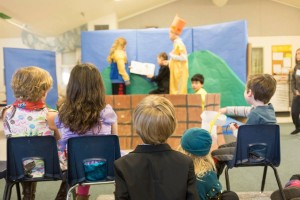Tell me and I forget. Teach me and I remember. Involve me and I learn.
~Benjamin Franklin
Being a confident reader does not happen over night, but through practice, encouragement, and the ability to process and apply feedback, a confident reader can emerge. Over the past few months, our literature classes have been exploring read aloud in a variety of reading situations. In search of comfortability and confidence strengthening, we have made choices to split up into groups, and even further down into pairs, instead of always reading aloud together in large circles. This practice has allowed our students time and space to become slowly accustomed to reading aloud. Now that it is a familiar activity in our literature classes, it has become more widely accepted and is met with little resistance. This does not mean that our students have mastered the skill of reading aloud; however, it does show that our reluctant readers have become more confident. Many of our once-reluctant-readers have become so confident that when they were presented with the responsibility of performing a Readers Theater for the school they stepped up to the challenge with vigor and with no complaints. As a result, our readers were an outstanding success, and not because they read without error, many stumbles indeed occurred, but their success came from their willingness to participate and from their positive attitudes.
I am always doing that which I cannot do, in order that I may learn how to do it.
~Pablo Picasso

You start realizing that good prose is crunchy. There’s texture in your mouth as you say it. You realize bad writing, bland writing, has no texture, no taste, no corners in your mouth. I’m a great believer in reading aloud.
~Janet Fitch
For months, I have modeled nuanced reading for all of our students, and have asked them to try to inject tone into their reading; at last, we are starting to get there, and an understanding is beginning to unfold. This week, as we began a new read aloud book, some students spoke up right away about the difficulty in understanding the overly nuanced or the “over-acted” reading some of our most enthusiastic students have enjoyed performing for us. Agreements have now been made that the tone needs to be more reasonable and understandable for the listener. Our recent Readers Theater experience also instilled a deeper understanding of both the value of listening and the importance of not interrupting another reader. In addition, to all the practice and explorations that have already incurred with read aloud, more intentionally is being added to our read aloud experiences. This week, as we begin a new book, I will be the main reader (modeling) and students can volunteer to read as they are ready. Our students main task while I am reading is to read along and take notes on the tone and mood; every few pages we stop reading so they can write a few words for the tone expressed on the whiteboard. This activity is connecting the inflections in my reading voice with the intended mood of the writing, and I hope will more easily rub off when it is their turn to read. With continued effort, and a willingness to listen and mirror, our Bixby students are well on their way to becoming confident and nuanced readers.
-Melodie
I like to listen. I have learned a great deal from listening carefully. Most people never listen.
~Ernest Hemingway


